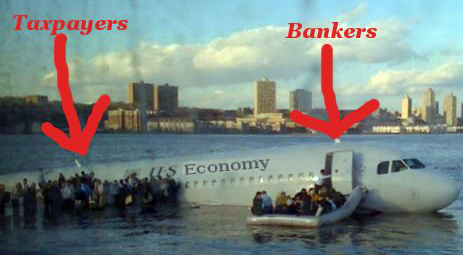| Sendedatum | 2009-01-18 20:53:30 |
|---|---|
| Ausgabe | 77 |
hier eine weitere Ausgabe des beliebten Newsletters für Masochisten und Weltuntergangssekten. Je nach Newsreader kann die Darstellung weniger als perfekt befriedigend sein, daher könnte sich ein Blick auf die Onlineversion lohnen, die außerdem verschlagwortet ist.
Beginnen möchte ich mir einer wunderschönen Feststellung, von http://josh.sg/2009/01/economists_were_invented_to_ma.html:
Economists were invented to make astrologers look good
Inhaltsverzeichnis:
- Sea Level Rise Of One Meter Within 100 Years
- Shipping rates hit zero as trade sinks
- ConocoPhillips to Take $34 Billion Charges, Cut Staff
- Saudi Supertanker Returns to Persian Gulf After Pirate Release
- Abu Dhabi Wealth Fund Lost $125 Billion
- Dubai Developer Delays Work on World’s Tallest Tower
- Dubai und Abu Dhabi: Immobilienpreisparadiese
- Oman Investment Stability Fund to Start ‘As Soon As Possible’
- Baltikum: Unruhen
- Brasiliens Importe und Exporte
- Chile: heavy losses for pioneering pension funds
- Finnland: State Pension Fund ready to invest hundreds of millions into corporate bonds
- Germany IS About To Have Its Worst Recession Since WWII
- Banken sitzen auf 300-Milliarden-Müll
- Heidelberg Cement
- Jedem sein Bailout...
- Irlands Stein im Länderdomino setzt sich in Bewegung
- Irland: Drastic steps needed to halt collapse of pensions
- Japan pension funds lose 16.5% in Apr-Dec
- Kanada: Nortel Networks ist pleite
- Kanada: Olympic Sized Depression Hitting Vancouver
- Östereich: Währungsfonds warnt vor Ostrisiko
- Taiwan’s Exports Drop By Record 41.9% on Global Slump
- UK Interbank Lending
- UK: 80% der Kreditvergabe außer Landes
- Ukraine’s Industrial Agony Continues In December
- Ungarns Industrieproduktion bricht ein
- US industrial production falls 8 percent in December
- U.S. Dec. industrial production down 2%, down 11.5% in Q4
- US petroleum demand in 2008 lowest in 5 years
- USA: Retail Sales Collapse in December
- USA: Office Vacancy Rates Rising
- USA: LA Area Port Traffic Collapses in December
- S&P 500 FINANCIAL SECTOR MARKET CAP CONTINUES TO SINK
- USA: CES 2009 Suffers 22 Percent Attendance Drop
- US-Arbeitsmarktdaten für den Dezember 2008
- USA: Layoffs: I read the news today, oh boy!
- USA: State Pensions’ $865 Billion Loss Affects New Workers
- California controller to suspend tax refunds, welfare checks, student grants
- US Stimulus, Wolf & Smith
- Venezuela: Chávez Lets West Make Oil Bids as Prices Plunge
Inhalt:
Assuming that the climate in the coming century will be three degrees warmer, the new model predictions indicate that the ocean will rise between 0,9 and 1,3 meters. To rise so much so quickly means that the ice sheets will melt much faster than previously believed. But it has already been observed that the ice sheets react quicker to increases in temperature than experts thought just a few years ago. And studies from the ice age show that ice sheets can melt quickly. When the ice age ended 11.700 years ago, the ice sheets melted so quickly that sea level rose 11 millimeters per year – equivalent to a meter in 100 years. In the current situation with global warming, Aslak Grinsted believes, that the sea level will rise with the same speed – that is to say a meter in the span of the next 100 years.
Die gute Nachricht: Das Meer kommt näher.
Die Schlechte: Der Traum so vieler Deutscher - nach Venlo ans Meer fahren zu können - wird wohl so schnell noch nicht eintreten.
"vielleicht können wir ja an Gebühren noch etwas verdienen".
Shipping journal Lloyd's List said brokers in Singapore are now waiving fees for containers travelling from South China, charging only for the minimal "bunker" costs. Container fees from North Asia have dropped $200, taking them below operating cost.
However, the latest phase of the shipping crisis is different. It has spread to core trade of finished industrial goods, the lifeblood of the world economy.
"This is no regular cycle slowdown, but a complete collapse in foreign demand," said Lindsay Coburn, ING's trade consultant.
Idle ships are now stretched in rows outside Singapore's harbour, creating an eerie silhouette like a vast naval fleet at anchor. Shipping experts note the number of vessels moving around seem unusually high in the water, indicating low cargoes.
It became difficult for the shippers to obtain routine letters of credit at the height of financial crisis over the autumn, causing goods to pile up at ports even though there was a willing buyer at the other end. Analysts say this problem has been resolved, but the shipping industry has since been swamped by the global trade contraction.
Mr de Trenck predicts Asian trade to the US will fall 7pc this year. To Europe he estimates a drop of 9pc – possibly 12pc. Trade flows grow 8pc in an average year.
He said it was "illogical" for shippers to offer zero rates, but they do whatever they can to survive in a highly cyclical market.
The company plans to reduce the value of its equity investment in Russia’s Lukoil by $7.3 billion, Houston-based ConocoPhillips said today in a statement. Other asset writedowns totaling $1.3 billion will be recorded.
The biggest writedown, a $25.4 billion impairment charge in the oil and gas business, amounts to 87 percent of all the goodwill the company had on its balance sheet as of Sept. 30, according to Bloomberg data. The company plans to report its actual fourth-quarter results Jan. 28.
Es ist, glaube ich, noch nie ein Zeichen von Gesundheit eines Unternehmens gewesen, 30 Mrd Dollar abgeschrieben zu haben.
Conoco Phillips bringt sich damit in so illustre Gesellschaft wie GM und Ford...
The Sirius Star, which was released Jan. 10, is currently off the coast of the United Arab Emirates near the Strait of Hormuz, according to the ship-tracking data. The Saudi Gazette reported Jan. 11 that the vessel was bound for Dammam.
The vessel and its cargo of about 2 million barrels of crude oil was hijacked 420 nautical miles (780 kilometers) off the coast of Somalia on Nov. 15. It was released after its owner paid a $3 million ransom, the Associated Press reported. All crew members were freed unharmed.
3 Millionen sind im Verhältnis ja geschenkt.
Aber dennoch: Vor dem Absturz der Ölpreise wären die 25 Mann der Besatzung wohl früher nach Hause gekommen.
Klingt ja schonmal nicht gut, basiert aber (natürlich) nicht auf Daten, sondern Schätzungen.
Abu Dhabi’s fund was managing an estimated $328 billion at the end of 2008 compared with $453 billion a year earlier, said the report, which examined the four largest Gulf Arab sovereign funds. “The size of the Abu Dhabi Investment Authority has been overstated, sometimes by as much as 100 percent.”
The Council on Foreign Relations, founded in 1921, is an independent organization that promotes understanding of foreign policy and America’s role in the world.
The Saudi Arabian Monetary Agency had $501 billion under management at the end of last year, up from $385 billion in 2007, the report said. The Kuwait Investment Authority and the Qatar Investment Authority at the end of last year managed $228 billion and $58 billion, respectively.
Naja, 125 Mrd Verlust klingt nach viel, aber andererseits könnte ich mir das durchaus vorstellen - alleine schon Citygroup macht ja schon 7 Mrd aus.

Den Autoren zufolge haben also die Saudis mehr Geschick oder Glück gehabt als all die anderen...
Der Dokumentation wegen:
Nakheel PJSC, a state-owned company that’s considering an initial public offering, will resume work on the building in 12 months, according to an e-mailed statement today. The tower, comprising office space and homes, will have a height of 1 kilometer (3,280 feet).
Nakheel changed its plan “to better reflect the current market trends and match supply with demand,” according to the statement. “The foundation works are likely to take approximately three years to complete.”
“The project was at an early stage, so it’s not difficult to put on hold,” said Sana Kapadia, an analyst at EFG-Hermes Holding SAE in Dubai. “Even 12 months may be too short a delay.”
Bis zu 50% Preisverfall im (noch nicht fertig gestellten) Burj Dubai - der angeblich am 9.9.09 eingeweiht werden soll.
Und Dh2700 pro Quadratfuß sind 735 Dollar pro Quadratfuß bzw. 7800 Dollar pro Quadratmeter. Immer noch viel, viel Geld für Wüstensand...
“Al Reem Island has seen quite a harsh reality check, because that was a real speculative market,” Mr Easton said. “You had actually 95 per cent speculators who had no intention of doing further payments. Residential properties in some cases [are now put into the market] at minus 15 per cent premium.”
According to Susan Cronin, the general manager of Aljar Properties, a broker based in Abu Dhabi, only prices involving bulk deals have decreased. “A floor of offices that was offered in Al Shams Abu Dhabi at Dh2,500 per sq ft three weeks ago is now being offered at Dh2,100,” she said.
Investors who bought properties on Reem Island at up to Dh2,700 per sq ft during Cityscape in May are expected to be the hardest hit if they intend to resell now. “Someone who is looking to exit today will have no choice than resell at around Dh1,800 per sq ft,” Mr Easton said. “The best thing people should do if they can is to hold.”
Ok, ich gebe es zu - das ist alles nicht meine Preisklasse. Für Dh2700 bekomme ich ungefähr eine Woche Tauchurlaub (mit Flug, Verpflegung und Tauchen) in Ägypten, und im Grunde genommen ist das auch viel nützlicher als ein 0.09 Quadratmeter Wohnung.
“Burj Dubai is an amazing area, but it will take a little more time [to make money]. You should have a capacity to hold on to it. This is not the seller’s market any more. It has become the buyer’s market now,” Mr Ali said.
Ja, hold on to it. Hold on tight, to your dream. It might be the last time you can see it.
Police used mace and truncheons to disperse rioters who smashed shop windows and overturned a police van after failing to storm parliament.
The violence followed a peaceful rally in which some 10,000 people accused the government of economic mismanagement and demanded new elections.
Latvia's economy is expected to contract by at least 5% this year.
Until last year, it was one of the fastest growing economies in Europe.
The violence followed a peaceful protest calling for early elections
Many Latvians frustrated by rising unemployment and tax hikes blame the centre-right governing coalition of Prime Minister Ivars Godmanis for their country's economic woes.
http://www.balticbusinessnews.com/Default2.aspx?ArticleID=80d5447a-c50b-4b83-8c8e-97555665bb7a&open=sec
Their goal is to stop some coalition reforms. People arrived with special buses and currently there are nearly 7000 of them.
The crowd demanded Saeima's chairperson Arūnas Valinskas to report them, but only Artūras Zuokas, the head of Liberal Union came out. People threw egg at him.
Valiskas' representatives said he can't come to the meeting for he is having a lunch with the President of Norwegian Parliament Thorbjørn Jaglandiga.
Police has strenghtened duties to avoid possible riot.
Couple of days ago a peaceful protest in Latvian capital Riga grew into riot.
Some protestors tried to break into the Parliament building, but police stopped them. People went behind Saeima and started to throw snowballs, rocks, bottles, eggs and smoke bombs at the building. They scream "Lithuania" and "Down with Saeima".
Wie kann der Pöbel es wagen, auf seine Verarmung mit Wut auf die Regierung zu reagieren?
Brasilien schien sich ja bisher recht gut zu halten, aber das dürfte sich gerade ändern:
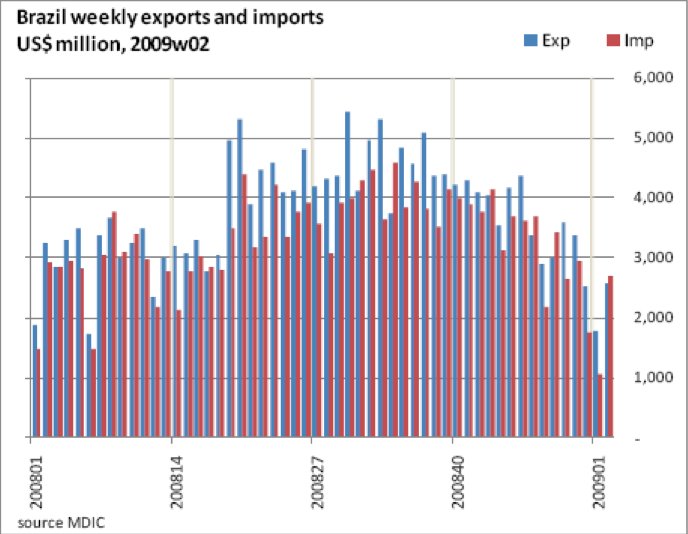
Government regulators say the five funds now total $69 billion.
The country's pioneering system lets workers choose funds in Chile and abroad to deposit retirement funds withheld from their salaries.
The most risky fund lost nearly 40 percent while the most popular one dropped by 19 percent.
Regulatory agency chief Solange Berstein said Monday that "the world crisis has an important impact on the pension funds."
The private pension system was established in 1981 and has been emulated by several countries.
Verluste zwischen 19% und 40%, durchschnittlich 26%. Beeindruckend.
Und sehr wahrscheinlich liegt das restliche Südamerika in ähnlichen Regionen.
Uwe Ohse, 2009-01-18
Ich bin nicht per se dagegen, daß Pensionsfonds in Unternehmensanleihen investieren - immerhin sind Anleihen in letzter Zeit oft sicherere Anlagen gewesen als die Aktien der jeweiligen Firmen.
Wenn allerdings staatliche Pensionsfonds Unternehmensanleihen - auf staatlichen Druck, natürlich - kaufen sollen, die kein anderer haben will, dann ist schwer erkennbar, in wie fern das sinnvoll sein soll..
In Tanskanen’s view, such a move would ease the plight of smaller companies, as more bank financing would become available to them.
Äh, wieso? Wenn eine Bank einem Kunden kein Geld geben _will_, dann will sie es auch weiter nicht. Und wenn sie ihm kein Geld geben _kann_, dann kann sie es auch weiter nicht. Die paar restlichen Fälle neben diesen beiden kann man getrost unter Rauschen abhaken...
Ja, paßt. Leider.
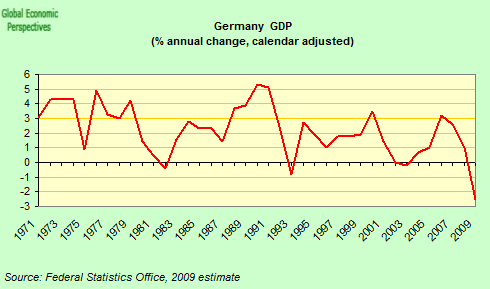
Der Artikel faßt dann die aktuelle Wirtschaftssituation ganz gut zusammen, und kommt dann zur Frage "was tun?".
Mit Ausnahme von kleineren Konjunkturprogrammen: Wenig. Und große verbieten sich...
Die FTD macht sich unglücklicherweise nicht die Mühe, einen passenden Titel zu wählen, daher hier mal die richtige Variante: "Banken sitzen auf 300-Milliarden-US-Müll, und ungezählten Milliarden sonstigem Mülls".
Danach besitzen diese Institute "toxische Wertpapiere" im Volumen von knapp unter 300 Mrd. Euro, von denen erst rund ein Viertel abgeschrieben worden sei. Der Rest stehe noch immer in den Büchern, schreibt der "Spiegel" weiter. Sowohl die Bafin als auch das Ministerium waren am Samstag zunächst nicht zu erreichen.
Kinder, ich sage das wirklich nur sehr, sehr ungerne - aber nicht nur die Amis haben Sondermüll geschaffen. Mit an der Produktion "toxischer Anlagen" beteiligt waren in prominenten Rollen Spanien, ganz Osteuropa, das Baltikum, Großbritannien, Irland, und eventuell auch Chinas (kein klares Bild), sowie die Geldgeberbanken aus der Schweiz, Österreich, Deutschland, Italien. Ich bin mir keineswegs sicher, daß das schon ein vollständiges Bild ist.
At a time when the financial crisis has brought private-equity deals to a near standstill, Goldman has expressed interest in taking a stake in HeidelbergCement, possibly in partnership with U.S. buyout firm TPG, these people said. PAI Partners, the French buyout house, is considering a separate investment, they said.
Ich bin sicher, den Mitarbeitern wird ein Mühlstein vom Herzen gefallen sein bei dieser Nachricht: Langfristig denkende Investoren wie die TPG sind ja die besten Freunde der Mitarbeiter.
Allen Sarkasmus weglassend: Warum sollte jemand Heidelberg Cement ausgerechnet _jetzt_ kaufen wollen? Das ist doch blankes Glücksspiel...
Nachtrag: Viel schöner ist das auf http://www.weissgarnix.de/?p=872 ausgedrückt:
[...]
Besonders erfreulich an einem solchen Deal wäre, dass sowohl Goldman als auch TPG einen bekanntermaßen langen Anlagehorizont pflegen, was dem Unternehmen in Zeiten absoluter Flaute am Bau natürlich entgegenkommen würde. Stabilität und kontinuierliche Entwicklung könnten Programm bleiben, während sich die Konkurrenz in kurzsichtigen, ausschließlich der Rendite geschuldeten Restrukurierungs- und “Down-Sizing”-Projekten zerfleischt. Zudem würden die beiden Investoren, denen übermäßiger Kredithebel schon immer ein Greuel war, womöglich für eine satte Stärkung der Eigenkapitalbasis von HeidelCement sorgen, was natürlich insbesondere in Zeiten des “Credit Crunch” auch politisch zu begrüßen wäre und durch die Baden-Württembergische Regierung auch entsprechend großzügig gefördert werden sollte …
Das gibt einen Schönheitspreis.
Umschulungen nennt man das.
In a presentation that drew several collective intakes of breath, Mr Kelly predicted that house prices would fall by 80 per cent from peak to trough in real terms.
80% ist nicht mehr schlimm, nicht mehr katastrophal, sondern unbeschreiblich.
The global financial crisis may have been positive for the Irish economy as it “stopped us dragging ourselves even deeper into our hole,” he said. “If it had taken another year or two, we would have ended up in an Icelandic-shaped hole, which is not to say that we won’t end up in one.”
Mr Kelly said the Government should abolish stamp duty on property, compile proper price and quantity statistics and restore competitiveness through a public sector pay cut of 10 per cent.
Irland mit Island zu vergleichen, nunja, ist der Sache leider irgendwie angemessen.
http://www.ft.com/cms/s/0/7ab08562-e226-11dd-b1dd-0000779fd2ac.html
Oops.
2008: Irische Pensionsfonds -35%.
Und 2009 beginnt mit der Befürchtung, daß ein paar hoch profilierte Firmenpensionsfonds bis Juni kollabieren.
Langsam plagt mich die Befürchtung, daß es Irland schlechter als Großbritannien gehen könnte.
Pension funds lost 11.6 percent on average in October-December as the plunge in global share prices and stronger yen hurt their overall performance, an official at Watson Wyatt's Japanese subsidiary said.
Watson Wyatt surveys about 120 pension funds in Japan on a quarterly basis.
The average return in the six months ended September was minus 5.6 percent.
Naja, der freie Fall war vor ein paar Jahren... das jetzt ist nur die Nachholung eines damals irrtümlich nicht ausgestellten Totenscheins.
Die Nortel-Networks-Aktie verlor in New York vorbörslich mehr als 70 Prozent und wurde dort später vom Handel ausgesetzt. An der Börse in Toronto knickte das Papier um mehr als 60 Prozent ein. Das größte nordamerikanische Unternehmen dieser Branche litt zuletzt unter einem Auftragseinbruch der Telefongesellschaften.
Nortel kämpft bereits seit Jahren mit massiven Problemen. Die weltweite wirtschaftliche Entwicklung habe die Lage nun weiter verschärft, hieß es. Noch habe Nortel flüssige Mittel von 2,4 Mrd. $. Der Gläubigerschutz solle dem Konzern den Weiterbetrieb und die Sanierung ermöglichen.
Alles halb so wild, flüssige Mittel von 2.4 Mrd Dollar.
Kann man eigentlich irgendwie erklären, wieso der Kurs von denen gefallen ist? Hätte die ach so effiziente Börse das nicht nach Nortel im Überlebenskampf (Nortel Networks hat einem Zeitungsbericht zufolge Berater engagiert, die unter anderem ein Insolvenzverfahren unter Gläubigerschutz prüfen sollen) seit über einem Monat eingepreist haben müssen?
http://www.bloomberg.com/apps/news?pid=newsarchive&sid=aaxGpBP1h4sk
Soso, 2.4 Mrd flüssig und $107 Mio nicht zahlen?
Mag mir vielleicht mal jemand deren Definition von "flüssig" erläutern? (ganz langsam, bitte, ich ahne daß die sehr nichttrivial sein wird)
http://futronomics.blogspot.com/2009/01/olympic-sized-depression-hitting.html
http://www.theglobeandmail.com/servlet/story/RTGAM.20090114.wbccampbell0114/BNStory/National/home
Das Parlament von British Columbia soll zu einer Sondersitzung zusammentreffen, um Vancouver zu erlauben, mehr als 450 Mio zu leihen um das olympische Dorf fertig zu stellen.
Es steht natürlich außerfrage, daß das Geld gut angelegt ist. Dafür bekommt man ja eine professionelle Jugendherberge mit dem Charme eines Gulag modernster Sicherheit.
City council this week requested that the province authorize the borrowing of more than $450-million by the city, which would provide Vancouver with a stronger position as it negotiates with the lender, Fortress Investment Group.
875 Mio. durch 1100 Einheiten ergibt circa 800 Tausend Dollar pro Einheit.
Anderswo werden dafür ganze Jugendherbergen gebaut, hier ein Zimmer...
Anderswo scheint aber die Meinung zu herrschen, daß dieser 450 Mio. Kredit nicht ganz unproblematisch ist:
http://www.cbc.ca/canada/british-columbia/story/2009/01/13/bc-olympic-credit-rating.html
Standard & Poor's on Tuesday issued a bulletin about the city's finances, saying the impact on the city's debt could be significant if it borrows money to fund the remaining construction of the village.
"We believe that there's going to be an event in the next three months that will have a negative impact on the city's credit profile," Stephen Ogilvie, an analyst with the agency, told CBC News.
Gut, zugegeben, S&P hat sich ein paar Jahre vertan, das Ereignis mit negativer Auswirkung auf das Kreditprofil Vancouvers war bereits die Bewerbung um die Winterspiele, aber das ist für S&P ja schon beachtlich schnell.
Hier ist einer: Einstellen.
Of these housing units, 730 are to be sold to the public after the Games, 120 will be used as rentals, while 250 will be set aside for social and affordable housing.
"Social and affordable housing" in einem Umfeld von Wohnungen von 800000 pro Person? Kurz gesagt: Zu lächerlich um wahr zu sein.
Hm, und wenn Anfang nächsten Jahres oder Ende diesen Jahres die ganze Bauerei in Vancouver vorbei ist, fällt die Bauwirtschaft da nicht nur in ein Tal, sondern einen Abgrund.
http://www.thestar.com/News/Canada/article/571324
Auch die Pleite von Nortel wirft einen Schatten auf die Olympischen Spiele. Nortel ist/war einer der Sponsoren, und hat die Telekommunikationsausrüstung gestellt (und wohl auch betrieben).
"As a partner, they have kept us informed every step of the way," said Chapin. "Most of Nortel's commitments to the Games have been delivered and will be in place by May."
"Das meiste" ist also geliefert und wird bis Mai installiert sein, so der Insolvenzrichter will (und eigentlich muß er dazu nein sagen).
Insgesamt finde ich das allerdings nicht unspannend: kann ein rettungslos verlorenes Unternehmen durch seine Beteiligung bei einer Olympiade noch irgendetwas gewinnen? Gibt es irgendeine Verpflichtung, in oder nach der Insolvenz weiter die Spiele 2010 zu sponsorn? Wie liefe das ab, wenn es diese Verpflichtung gäbe und Nortel in mehrere Einzelteile zerschlagen wäre? Wird eventuell irgendein Aktionär klagen, weil das Sponsoring olympischer Spiele Kapitalverschwendung war?
http://www.cbc.ca/canada/british-columbia/story/2009/01/14/bc-onni-condo-sale.html
The marketing strategy by Onni Group of Companies is aimed at selling off hundreds of condos in its inventory.
About 375 unsold condominiums in cities such as Richmond and New Westminster will be offered at 20 to 40 per cent off, a real estate insider told CBC News.
Home prices in the Vancouver real estate market dropped almost 11 per cent between December 2007 and the end of 2008, according to a special price index updated earlier this month by the Real Estate Board of Greater Vancouver.
And the number of homes sold in 2008 fell more than 35 per cent from 2007 sales of more than 38,000 homes.
Richmond und New Westminster sind Vorstädte von Vancouver...
Oh, eine dominante Position.
Nicht vielmehr eine selbstmörderische Position?
Etwas besser wird die Lage der Erste Bank eingeschätzt, die stärker in den stabileren Nachbarländern aufgestellt ist als Raiffeisen. Die Währungsverluste dürften laut Oppenheim 2008 das Eigenkapital um 164 Millionen Euro drücken. In Rumänien, wo die Erste seit dem Erwerb der BCR Lokalmatador ist, könnten laut den Analysten auch die Buchwerte angetastet werden. Ähnlich stellt sich die Situation für die Bank Austria, dem Marktführer im Osten, dar, allerdings wird das Institut wegen seiner Zugehörigkeit zur UniCredit nicht gecovert.
Naja, was sind schon 516 Millionen? Peanuts, verglichen mit 70% des BIP (2004: 230 Mrd).
Ergo ist das nicht mal ein nennenswerter Bruchteil des wirklichen Risikos...
Aua:
[...]
Taiwan’s exports fell to $13.6 billion last month, compared with $16.8 billion in November. Imports declined 44.6 percent to $11.8 billion, resulting in a trade surplus of $1.86 billion.
[...]
Shipments to China decreased 57.1 percent because of weaker demand for electronic components used in products assembled by the mainland for export. Shipments to the U.S. declined 23.5 percent from a year earlier. Exports to Europe fell 29.5 percent.
China and the U.S. are Taiwan’s two biggest markets. Exports are equivalent to about 70 percent of the island’s gross domestic product.
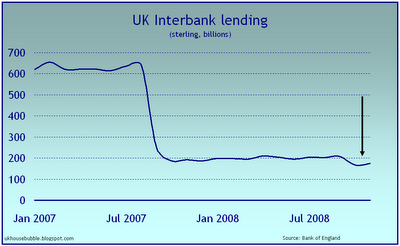
Anderthalb Jahre keine Erholung...
Meanwhile, up to 80 per cent is tied up in loans to foreign nationals and companies, bond issues and other investments.
Übersetzung: Quellen in der britischen Regierung sagten, sie haben entdeckt, daß einige größere britische Geldverleiher nur 20% inländische Kredite auf der Bilanz haben. Schockierend, nicht?
Aus irgendeinem Grund glaube ich, daß der Regierung Brown langsam die Ausreden ausgehen.
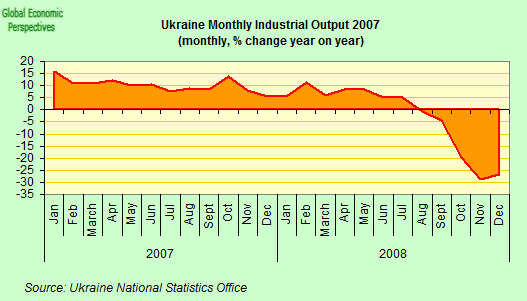
Katastrophale Zahlen mit einem minimalem Lichtblick.
Ausschlaggebend für den starken Rückgang ist vor allem die Reszession in der Eurozone. Ungarn exportiert rund 57 % seiner Waren dorthin. Mit Beginn der Rezession im dritten Quartal ist dort die Nachfrage deutlich zurückgegangen.
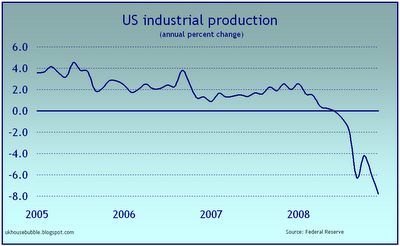
Und so dreht sich die Todesspirale Runde um Runde weiter...
America's demand for crude oil fell to its lowest level since 2003 last year, as record high prices to start the year and an ailing economy at the end of 2008 combined to sharply curtail consumption, new statistics show.
For all of 2008, U.S. petroleum deliveries -- a measure of demand -- fell 6 percent to 19.4 million barrels a day, with declines for all major products made from crude, according to a report released Thursday by the American Petroleum Institute, the industry's trade association.
Jet fuel deliveries fell 6.1 percent, distillate fuel oil, including diesel, was down 5.8 percent and gasoline deliveries slid 3.3 percent -- the lowest level in five years, API said.
Wenn der US-Bedarf für Öl in 2008 gegenüber 2007 um 6% gefallen ist, und der Rest der Welt mitgehalten hat (und so in etwa wird das zutreffen), dann sind von den ~80 Mio Barrel pro Tag rund 4 weggebrochen. Faszinierend, wieviel ein paar Prozentpunkte ausmachen können.

[...]
Austin’s overall office vacancy rose to 19 percent in 2008, compared with a 14 percent overall vacancy rate in 2007, according to a report released today by Oxford Commercial
Naja, und wie die Aussichten für die nächsten Jahre sind, sieht man hier:
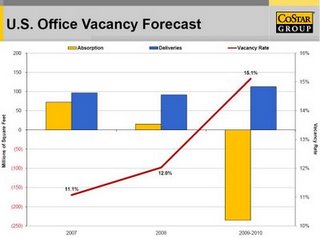
"Negative absorption" are two words no developer ever wants to hear.
Ein kleines Spiel mit Zahlen:
2008 kamen so um die 75 Mio. Quadratfuß ungenutzter Bürofläche dazu, von der Graphik her zu urteilen. 2007 auf 2008 stieg die Leerstandquote von 11.1 auf 12%.
Das heißt: 100% entspricht circa 8300 Mio. Quadratfüßen. Davon sind leer: 1000 Mio.
2009/10 sollen jeweils >= 110 Mio. Quadratfüße dazu kommen.
Am Ende von 2010 sind's also 8500 Mio. QF.
Der leere Raum erhöht sich um 360 Mio. QF pro Jahr: 1000+2*360=1700.
Damit komme ich am Ende von 2010 auf 20% Leerstandsquote.

Inbound traffic was 19% below last December. This slowdown in exports (inbound traffic to the U.S.) is hitting Asian countries hard.
But even more shocking and important for the U.S. economy is that export traffic has collapsed. For the LA area ports, outbound traffic continued to decline in December, and was 30% below the level of December 2007. Export traffic is now at about the same level as in late 2005. So much for the export boom!
Now it is the export bust.

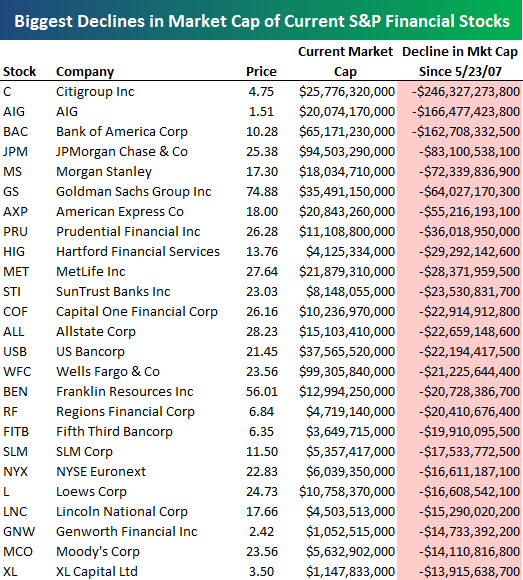
ok, ich gebe zu, ich kenne keine noch mehr überbewertete Messe als die Consumer Electronic Show (CES). Immerhin sage ich mir schon seit über einem Jahrzehnt jedes Mal auf's Neue, wenn ich die Bilder und Berichte davon lese - und aus irgendeinem masochistischen Grund tue ich das immer wieder - etwas in der Art von "im Westen nichts Neues" oder "hab' ich das nicht alles schon mal gesehen". Ja, über die CeBit denke ich dasselbe.
Im Endeffekt muß eine Firma, die auf einer der Messen ausstellt:
- ihre Kundschaft persönlich vorher einladen (mit Wegbeschreibung),
- einen fürchterlich überdrehten Stand bauen, um nach den üblicherweise auf den besten und unübersehbarsten Plätzen auftretenden Giganten überhaupt noch aufzufallen,
- Baldrian für die völlig genervten Mitarbeiter bereit stellen, und je nach persönlichem Pech auch Psychotherapeuten,
- mit den üblichen Kündigungswellen nach Messen leben (wobei man darüber streiten kann, ob die Leute kündigen weil sie auf der Messe etwas besseres gefunden haben, oder ob sie kündigen, weil sie im neuen Arbeitsvertrag "keine Anwesenheit auf Consumer-Messen erforderlich" stehen haben).
- mehrwöchigen Leistungsabfall der Mitarbeiter verkraften,
- enttäuschenden Kundenreaktionen schönreden können. Nicht jedes Mal, aber meistens - weil nämlich auf solchen Veranstaltungen nur das ganz deutlich überdurchschnittliche überhaupt richtig auffällt, und die Mathematik legt nahe, daß das deutlich überdurchschnittliche in weniger als 50% der Auftritte dabei ist.
Bevor ich das ganz ausarten lassen: Ich halte die gigantischen Consumerelektronicmessen für reine Zeit- und Geldverschwendung für die Staffagefirmen.
Insofern könnte es natürlich sein, daß der Einbruch bei den Zuschauerzahlen bedeutet, daß diese Einsicht auch anderswo angekommen ist.
Oder er könnte bedeuten, daß es wirklich wenig Hoffnungen auf interessante Neuvorstellungen gab und auch wenig Bedarf, die Dinge mal anzufassen, die man sonst nur im Fernsehen sieht.
Oder aber... naja, all fucked up.
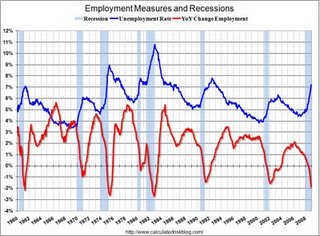
The unemployment rate rose to 7.2 percent; the highest level since January 1993.
Year over year employment is now strongly negative (there were 2.6 million fewer Americans employed in Dec 2008 than in Dec 2007). This is another extremely weak employment report ...
Arbeitslosenquote U3: 7.2%.
http://www.calculatedriskblog.com/2009/01/over-8-million-part-time-workers.html
In Wirklichkeit ist die Situation allerdings noch deutlich schlimmer:
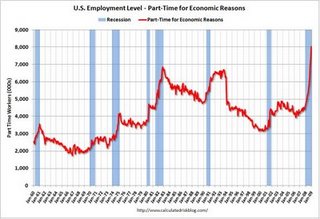
Not only has the unemployment rate risen sharply to 7.2%, but the number of workers only able to find part time jobs (or have had their hours cut for economic reasons) is now over 8 million.
Of course the U.S. population is significantly larger today (about 305 million) than in the early '80s (about 228 million) when the number of part time workers almost reached 7 million, but the rapid increase in part time workers is pretty stunning.
Die Quote der Teilzeitarbeiter ist von 3.0 (Dezember 2007) auf 5.2 (Dezember 2008) gestiegen, die Arbeitslosenquote von 4.9 auf 7.2.
Links auf die jeweiligen Artikel hat CR:
Bloomberg: GE Capital May Cut as Many as 11,000 Jobs This Year
WSJ: Pfizer to Cut Up to 2,400 Jobs
WSJ: Google Plans 100 Layoffs of Recruiters
AP: AMD to cut 1,100 workers, 9 pct of staff
Reuters: Hertz to cut more than 4,000 jobs
Bloomberg: WellPoint Cuts 1,500 Jobs, Blames ‘State of Economy’
AP: Blue Cross Blue Shield to cut up to 1,000 jobs
Tampa Bay Business Journal: Report: Layoffs looming at Clear Channel
I'm sure I missed a few ...
Assets for 109 state funds declined 37 percent to $1.46 trillion over the 14 months ended Dec. 16, according to the Center for Retirement Research at Boston College.
$865 Mrd. Verluste zwischen Oktober 2007 und Dezember 2008... Unfaßbar.
Chiang said he had no choice but to stop making some $3.7 billion in payments in the absence of action by the governor and lawmakers to close the state's nearly $42-billion budget deficit. More than half of those payments are tax refunds.
Keine Steuerrückzahlungen, keine Wohlfahrt-Checks, ... vom Staat von Kalifornien an die Bürger mehr am 1.2.2009.
"It pains me to pull this trigger," Chiang said at a news conference in his office. "But it is an action that is critically necessary."
The payments to be frozen include nearly $2 billion in tax refunds; $300 million in cash grants for needy families and the elderly, blind and disabled; and $13 million in grants for college students.
Wenn das alles nicht so pervers wäre, würde ich jetzt irgendetwas Sarkastisches schreiben über demokratische Staaten, die zwei Kriege mit Irrsinnskosten führen, aber kein Geld für die Sozialhilfe habe.
Yves Smith faßt Martin Wolfs Artikel Why Obama’s plan is still inadequate and incomplete zusammen:
The Congressional Budget Office forecasts that US output will be 7 per cent below potential over the next two years, on unchanged policies. If so, the actual deficit should now be much larger than the structural one. It is easy to see, therefore, why the critics argue that the Obama plan for an additional fiscal stimulus of 5 per cent of GDP over two years is too small, even though the CBO forecasts a baseline deficit of 8.3 per cent of GDP this year. It is also easy to understand why many object strongly to tax cuts, since the more likely cuts are to be saved the larger the package must be – and, in addition, taxes will clearly have to rise in the longer term.
So to get where we need to get (if you buy the logic of this sort of exercise) is an additional 6.3% PER ANNUM deficit as a % of GDP. Remember, Obama's plan is roughly 2.5% per year. 6.3/2.5= 2.5 times.
Read that again, If you believe the math, Obama's program would need to be 2.5 times bigger to live up to its billing. And that is before you get into details like "tax cuts are likely to be less effective than other measures".
Was ich mich aber frage: Wie kann irgendein Staat solche gewaltige Mengen Geld _ohne_ Fehlallokation, Verschwendung und Korruption kurzfristig finanzieren? Gerade in Anbetracht der Tatsache, daß dieser Staat überhaupt keine Fähigkeit bezüglich Controlling gezeigt hat (siehe: Iraq, TARP) und daß seiner Wirtschaft diese Fähigkeit ebenso offensichtlich noch stärker fehlt, prognostiziere ich hiermit schon mal üble Korruptionsraten in den USA.
Until recently, Mr. Chávez had pushed foreign oil companies here into a corner by nationalizing their oil fields, raiding their offices with tax authorities and imposing a series of royalties increases.
But faced with the plunge in prices and a decline in domestic production, senior officials have begun soliciting bids from some of the largest Western oil companies in recent weeks — including Chevron, Royal Dutch/Shell and Total of France — promising them access to some of the world’s largest petroleum reserves, according to energy executives and industry consultants here.
Their willingness to even consider investing in Venezuela reflects the scarcity of projects open to foreign companies in other top oil nations, particularly in the Middle East.
But the shift also shows how the global financial crisis is hampering Mr. Chávez’s ideological agenda and demanding his pragmatic side. At stake are no less than Venezuela’s economic stability and the sustainability of his rule. With oil prices so low, the longstanding problems plaguing Petróleos de Venezuela, the national oil company that helps keep the country afloat, have become much harder to ignore.
Prinzipientreue ist das wichtigste Gut eines jeden Politikers. In diesem Fall: Das Prinzip, um der Macht willen auch mit dem Teufel zusammenzuarbeiten.
Mir ist völlig klar, daß man die Leute vorne zuerst wegholen mußte, um die Tür zumachen zu können und den Vogel luft/wasserdicht machen zu können, aber die Satire und die scheinbare Zuerstrettung der ersten Klasse sind irgendwie zu schön, um sie auslassen zu können.
Gruß, Uwe
Wollen Sie den Digest abbestellen?
